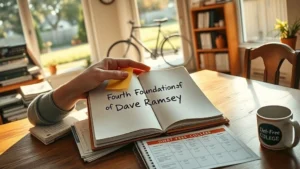Subtle Money Mistakes
You ever feel like you’re doing everything “right”—saving a little, paying the bills, even eyeing your first investment account—but somehow money still leaks out somewhere? It’s that weird feeling, like you keep pouring water into a bucket, but there’s a hole hiding in the bottom. Seriously, most of us miss the hole until there’s a puddle underfoot…
I used to think, “As long as I’m spending less than I make, I’m golden.” Newsflash: that’s only step one. If you ever leapfrog from a couple bucks in savings straight into buying stocks, or grab a car loan because “everyone else does,” I hear you…that was me, too. But—and this is big—if you skip steps, money finds a way to boomerang out of your life. Let’s talk about why it matters to take the five foundational steps in order, because honestly, your future self will do a happy dance.
Basics Change Everything
What Are These “Foundations,” Anyway?
Okay, let’s lay it out. The Five Foundations of personal finance, if we want to sound official (don’t worry, no stiff collars here), go like this:
- Start an emergency fund ($500 is the classic starter goal)
- Get out (and stay out) of debt
- Pay cash for your car
- Save for future goals (think college funds or big milestones)
- Build wealth—so you have choices, not just bills
But, Why is it important to do the five foundations in order? Well, imagine trying to run before you can walk…or building the roof before walls are up. Not gonna hold up in a storm, right?
Where Most People Stumble
Ever “treated yourself” to a new phone, only to find out later you needed that cash for a flat tire? Or jumped into investing while still juggling credit card debt? That’s the real-life version of skipping steps. (Been there. It’s not fun…or cheap!)
Spot the Leaks Table
| Impulse Trap | Intentional Win | Savings Boost |
|---|---|---|
| Ordering takeout (3×/week) | Meal prep at home | $120–$180/month |
| Streaming subs you forgot | Cancel or bundle | $20–$40/month |
| Late fees | Automatic reminders | $10–$50/month |
It’s wild: those “little” leaks are usually hiding, not shouting, in our bank statements. Catch them early and your emergency fund basically builds itself.
Building Your Safety Net
The Make-or-Break Fund
Let’s get brutally honest—most stress about money comes from not having backup when life throws curveballs. The fridge dies, the car says “nope,” or a medical bill lands in your mailbox. (Ask me about the water heater flood of 2020… actually, don’t. Still hurts.)
This is why starting with a small emergency fund is step one for the five foundations. Not later. Not after you pay off all the fancy stuff. It’s first for a reason. Even $500 tucked away means those “oh crap” moments don’t wreck the whole month. Plus: Have you checked what are some of the costs of living on your own? Spoiler—emergencies always cost more than you think.
Why Tracking Comes Before Tweaking
Honestly, there’s no point trimming your daily latte if you don’t know where your cash is really going. When I finally started tracking every dollar (sticky notes, apps, muttering to myself in the checkout line), it was eye-opening. My “miscellaneous” spending? Ouch. I stopped finding money “disappearing.”
Real Talk—Quick Story
A friend—let’s call her Sam—never tracked her expenses, assumed she was good, then realized after six months her “gym membership” was still coming out…even though she’d quit. $45/month, wasted. That’s almost $300 before she caught it. Give your future self a break: track first, cut later.
Saving: The Snowball Effect
Why Saving Comes Before Debt
This part tripped me up for ages. My brain screamed, “Pay off the debt! Ignore savings ’til then!” Sounds noble…until you have an emergency, put it on the card, and suddenly… more debt. I felt like I was on a hamster wheel, no matter how fast I ran.
The trick? Save up a small emergency fund before going full throttle on debt. That way, you break the “borrow-panic-repeat” cycle. It’s foundational for a reason—skip it, and the other steps never stick.
Avoiding the Debt Trap
If there’s a villain in the money story, it’s high-interest debt. Doesn’t matter if it’s a credit card, payday loan, or that sneaky “buy now, pay later” app. They drain you in silence—like vampires for your wallet.
Tackling debt works best when you’re not constantly slipping back because of surprise bills. That’s why you do the five foundations in order. You build your buffer, then you fight down the debt.
Spotting Hidden Debt Questions
- What’s lurking on your statements?
- Do you know your total balance, or just the minimums?
- Got a forgotten “free trial” gone rogue?
Pro tip: If you’ve got extra time this weekend, do a mini audit. List every monthly bill. Nuke what you don’t need. (It feels kinda awesome.)
Investing, One Step at a Time
Tempted to Skip Ahead?
Let’s be clear: investing is exciting! We all want that “making money while you sleep” magic. But here’s the catch—if you start before you’re ready (aka: still juggling debt, juggling emergencies, or don’t know your basics), it’s a recipe for stress. I’ve watched friends cash out investments early to pay for life’s curveballs. All that growth… gone in a blink.
Following the five foundations in order keeps you steady—so when you do invest, your money isn’t just growing, it’s sticking around.
Rent vs. Own: The Real-Life Balancing Act
If your Instagram feed is full of people buying houses, it’s easy to feel “behind.” Reality check: sometimes renting is a superpower for frugality. Know Which best describes why renting a place to live is generally cheaper than buying a home?? No sudden repair bills, lower insurance costs, less commitment. That’s more money in your pocket while you build a bulletproof foundation.
One of my friends rented intentionally for five years, socked away savings, and avoided wild surprises like leaky roofs or surprise taxes. When she was truly ready, she asked herself—When you’re ready to buy a house, the best option is a what?—and found a mortgage with a low principal, locked solid by all those years of prep. Meanwhile, others rushed in before they had the basics, and guess what? More stress, less vacation. You get the picture.
Why Order Truly Matters
The Roll-Down-Effect (a.k.a. The Tumbleweed Moment)
This is where most people get tripped up (sometimes, literally). There’s this idea—maybe from seeing social media “success stories” or well-meaning family advice—that if you just hustle at every money angle, you’ll win. But nope. If you try to build wealth before you have your roots down, you end up spinning in circles.
According to conversations about the five foundations, plus insights like insights about why order matters, the steps build on each other. Skip a step? You might have to undo work later.
Anecdote Time: Out of Order Regrets
A friend from college started investing in stocks with $500—before she had anything saved, before budgeting, while still battling student loan debt. When her car broke, she had to sell off investments at a loss to cover repairs. That “forward” move ended up a step back. Meanwhile, another pal, Steve, took it slow. Savings, debt, then investing. He never cashed out early. He didn’t look flashy, but year after year, he pulled ahead—with less stress. It’s not a race, but if it was, Steve would be wearing the gold medal for chillness.
So, What Are My Five?
- Emergency Fund First — $500 gets you breathing room.
- Debt Freedom — Knock out high-interest stuff, one chunk at a time.
- Cash Cars — No more loans that keep you spinning. Save first, shop smart.
- Future Goals — Start stashing for big dreams (college, house, whatever makes your eyes light up).
- Wealth Building — Now, investing makes real sense; you’re ready for the long game.
Your Next Step, Friend
Let’s pull it together (messy budgets and all): Why is it important to do the five foundations in order? Because these steps are stacked like dominoes. Skip one, and the rest wobble. Start easy. Track what you spend—seriously, today! Put away what you can (even a few bucks). Cut out money-wasters. Then, the fun stuff—like investing, or owning a home—gets easier, not riskier.
Remember, nobody’s perfect at this. We’re all just trying to dodge surprise bills, live a little, and maybe have enough for pizza night and a dream trip someday. If you’re wondering what are some of the costs of living on your own?, check the small stuff—utilities, rent, insurance. It adds up…but you can handle it by nailing these steps in order.
Thinking about a move, or saving for that first home? Ask yourself—when you’re ready to buy a house, the best option is a what?—and wait until you’ve tackled the previous foundations. Renting might be smarter, look at which best describes why renting a place to live is generally cheaper than buying a home? while you buffer your bank account. There’s no shame in doing it your way, at your pace.
Financial security is personal, and a little messy—kind of like real life. Ready to set your money foundation strong? One step today beats a plan that never starts. Let me know what trips you up…or your favorite frugal win. We’re in this together, and honestly, I’m rooting for you. (P.S. Celebrate your tiny wins. Champagne optional. Happy budgeting!)













